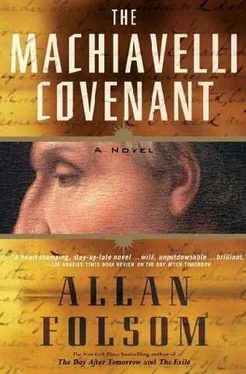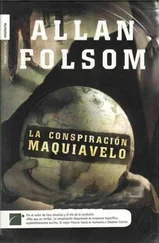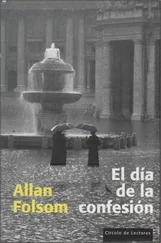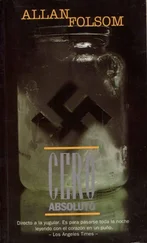"Caroline Parsons believed her husband and son were murdered. That the plane crash was no accident."
"Now we're back to the used cars. Marten, in this town there's a goddamn conspiracy theory in every toe-nail clipping. If that's all you have, forget it."
"Would it make any difference if I said she told me that on her deathbed? Or that she was convinced the staph infection that killed her in so short a time had been deliberately administered?"
"What?" Fadden's interest was suddenly piqued.
"I realize she'd just lost her husband and only child and was dying herself. The whole thing could have been in her mind, the rantings of a terrified, hysterical widow. And maybe they were, but I promised her I'd do what I could to find out and that's what I'm doing."
"Why? Who were you to her?"
"Let's just say that at some point in our lives we-" Marten paused, then went on, "-loved each other very much and leave it at that."
Fadden studied him. "She give you anything real? Specifics? Why she believed it?"
"As in hard evidence? No. But she was supposed to have been on the same plane with her son and husband. She told me, or tried to tell me, that 'they' were responsible for the crash. When I asked her who 'they' were, she said 'the ca,' but that was all she got out. She couldn't finish it and never did. In thinking it over and tying it to her husband's death, the only thing that made sense was that maybe she was trying to say 'the ca -mmittee.'
"The last committee meeting Mike Parsons attended before he died was the House Subcommittee on Intelligence and Counterterrorism. It took place on Tuesday, March 7, at the Rayburn House Office Building. Its subject was 'Progress in Consolidating Terrorist Watch Lists.' The thing about it is, there are no lists of witnesses who were to appear before the committee. Now I don't know much about how these things work, but scanning the Congressional Record for other committees over a two-week period I never found another that didn't have at least one witness to be presented. And that's why I need you, not just to walk me through the high school algebra of how all this works, but because you're a Washington insider who Dan Ford trusted. You know what goes on in these committees even if you don't write about it. Well, I want to know what was going on in Parsons's committee. What it was about. Why there were no witnesses. What might have happened there that could have made Caroline's suspicions real."
"You're pursuing this emotionally, you know that," Fadden said quietly.
Marten stared at him. "You weren't there. You didn't hear the fear in her voice or see it in her eyes. In her whole being."
"Did it ever occur to you that you might be pissing in the wind?"
"I didn't ask for your opinion, I asked for your help."
Fadden picked up his coffee cup, held it for a moment, then drained it and stood up. "Let's take a walk."
Marten and Peter Fadden came out of Mr. Henry's under a partly cloudy sky. Crossing Seward Square, they started up Pennsylvania Avenue toward the U.S. Capitol.
"Caroline Parsons thought her staph infection had been deliberately administered," Fadden said.
"Yes."
"She say by who?"
"We're still off the record," Marten said guardedly.
"You want my help, answer the damn question."
"Her doctor."
"Lorraine Stephenson?" Fadden was clearly surprised.
"Yes."
"She's dead."
Marten half smiled. So at least somebody else did know. "She was murdered."
"How the hell do you know? That information hasn't been made public."
"Because the police told me. I'd called Stephenson several times to ask her about Caroline's death. She refused to discuss it. The police went over her phone records and found me. They thought I might have been angry enough to do something about it."
"Were you?"
"Yes, but I didn't kill her." Suddenly Marten found an opening. If Fadden knew Lorraine Stephenson had been killed, he might also know something of what the police had found, why they were so convinced it had been murder, and why they were still holding the information back. "Fadden, the police talked to me yesterday. Her murder has still not been made public. Why?"
"Notification of next of kin."
"What else?"
"What makes you think there's anything else?"
"She was a name in this town. She was the longtime doctor to a number of people in Congress. Moreover, she was Caroline Parsons's personal physician. Caroline's memorial service is this afternoon. Maybe someone is afraid someone else might see a coincidence and start looking a little further."
"Who might that be?"
"No idea."
"Look, Marten, as far as I know you're the only one who thinks Caroline Parsons was deliberately killed. Nobody else has even suggested it."
"Then why has the murder of a prominent physician been kept so hush-hush?"
"Marten"-they walked by several people, and Fadden waited until they were past-"Lorraine Stephenson was decapitated. It took them that long to find out whose body they had. Her head was nowhere around. Nobody's found it yet. The police want some time to poke around on the quiet."
Decapitated? Marten was stunned. So that was the reason there'd been no publicity. It also meant someone had been there only moments after he'd fled, seen what had happened and decided to change the makeup of the entire thing. And they had, quickly and efficiently. It made him think what he had before, that the suicide of a woman of Dr. Stephenson's prominence would be far more carefully scrutinized than if she had been simply murdered. The decapitation naturally removed any suspicion of suicide, but to him, the only person who knew the truth of what had happened, it raised the specter of conspiracy. That someone wanted to cover up one crime with another brought the whole Mike Parsons committee thing back in a rush.
"Fadden," he said, "let's get back to Mike Parsons. His subcommittee on intelligence and counterterrorism. What was it focused on? Why no formal witnesses?"
"Because it was a classified investigation."
"Classified?"
"Yes."
"About what?"
"A top-secret apartheid-era South African biological and chemical weapons program long thought to have been dismantled. The CIA had given the committee a checklist of covert weapons programs that foreign governments had previously had in development so in the future, if push came to shove, they wouldn't commit the WMD mistakes we did before the war on Iraq. The South African program was one of them. The committee wanted to be certain it was as dead as the government claimed."
"Was it?"
"From what my sources tell me, yes. They had the top chemical and biological scientist who headed it on the hot seat for three days and finally concluded that the program had been abandoned as officially declared years ago."
"Meaning?"
"Meaning that all the weapons, pathogen strains, documents, and anything else pertinent had been destroyed. That there was no longer anything there."
"What was the man's name, the scientist who headed it?"
"Merriman Foxx. Why, did Caroline Parsons mention him?"
"No."
Marten looked away and they walked on in silence, the domed Capitol looming in front of them, the pedestrian and motorized traffic around them picking up, the daily activity of the seat of the federal government growing exponentially as the lunch hour ended. A moment later Marten thought of two separate things in rapid order.
The first was what Stephenson had said in the dark, icy seconds on Dumbarton Street before she shot herself, apparently taking him for one of the conspirators. You want to send me to the doctor. But you never will. None of you ever will. Never. Ever .
The second was what Caroline had uttered in her sleep- I don't like the white-haired man, she'd said, fearfully ranting about a white-haired man who had come to the clinic where she had been taken after her breakdown following the funerals of her husband and son and the subsequent injection by Dr. Stephenson.
Читать дальше












